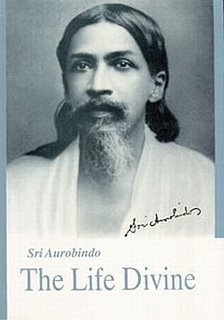|
A Psychological Approach to Sri Aurobindo's |
|
The Life Divine |
|
|
|
Chapter
XV Part 2
|
 |
It is interesting to note that God is ordinarily viewed either as
(a) An impersonal Divine, without features or attributes, or
(b) As a personal Deity, or
(c) As both personal and impersonal because the Divine is ‘All-Existence’.
Sri Aurobindo’s description of the Supermind principle provides the metapsychological basis of the Impersonal and Personal poises of the Divine.
The ‘Impersonal’ Divine The comprehending principle of the Supermind deals with the impersonal psychological truth of the divine consciousness. This is because it reflects the INDIVISIBILITY of the Absolute Consciousness where Existence, Consciousness-Force and Bliss are inseparably linked though bearing the potentiality of differentiation.
The Knower, the Knowledge and the Known are not different entities but fundamentally one. The indivisibility of the comprehensive Supermind contains the multiplicity of creation without deviating from its own unity. |
Anything that is indivisible cannot theoretically contain any unique ‘centre’ or ‘point’ – hence the indivisible consciousness of the comprehending Supermind has no place for the ‘individual separated ego’ or ‘independent centre of existence’ , though it simultaneously contains the potentiality of the phenomenon of individualization.In other words, if the ‘indivisible’ comprehensive Supermind consciousness holds the potentiality of individualization, each ‘individual’ creation reflect the ‘indivisibility’ so that the ‘oneness’ is not divided and distributed but ‘equably self-extended, pervading its extension as One, inhabiting as One the multiplicity of forms, it is everywhere at once the single and equal Brahman. For this extension of the Being in Time and Space and this pervasion and indwelling is in intimate relation with the absolute Unity from which it has proceeded, with that absolute Indivisible in which there is no centre or circumference but only the timeless and spaceless One. That high concentration of unity in the unextended Brahman must necessarily translate itself in the extension by this equal pervasive concentration, this indivisible comprehension of all things, this universal undistributed immanence, this unity which no play of multiplicity can abrogate or diminish. “Brahman is in all things, all things are in Brahman, all things are Brahman”, is the triple formula of the comprehensive Supermind, a single truth of self-manifestation in three aspects which it holds together and inseparably in its self-view as the fundamental knowledge from which it proceeds to the play of the cosmos’.(Ibid,pg150-151)
To the student of the Indian classical spiritual tradition, a valid query arises : What would be the difference between the indivisibility of the Sachchidananda Consciousness and the indivisibility of the Comprehensive Supermind Consciousness?
In both Sachchidananda and the comprehensive Supermind consciousness, Existence, Consciousness-Force and Bliss are inseparably linked. But in Sachchidananda, the indivisibility is ABSOLUTE and there can be no creative movement. Sachchidananda can be conceptualized as a ‘ABSOLUTE’ or INFINITE consciousness.
The comprehensive Supermind consciousness holds the creative vision like a ‘in-built’ program and the apprehending Supermind Consciousness engineers that pre-programmed creative movement to fruition. Hence the indivisibility and unity of the comprehending Supermind is modified and not absolute like that of Sachchidananda.
It is interesting to note that as the term ‘God’ is traditionally ascribed to the ‘Creator’, the creative Supermind does justice to that concept rather than Sachchidananda that is beyond creation.
At the level of the mind, the creation blossoms in multiplicity, epitomizing ‘individualization’. The sense of unity is lost in essence so that individual forms can be unique with maximum utilization of potentials.
One can understand this movement of unity to multiplicity by considering the relation between the ‘tree’ and the ‘seed’. At the level of the mind, the ‘tree’ and the ‘seed’ are two distinct entities though one is related to the other. The tree grows from the seed and the seeds are produced from the fruits of the tree and they go and complementing and fulfilling each other. At the level of Sachchidananda, neither the tree nor the seed exist. It is a Consciousness that surpasses all cognition. At the level of the comprehending Supermind, the seed-tree phenomenon is present as a creative essence. That essence not only holds the creative ‘idea’ but also the necessary ‘force’ to make the idea effective. Moreover, there is also the ‘law’ that is needed so that ‘idea-force’ can blossom in a field that has the milieu conducive for the blossoming. Such a field will be provided by Time-Successions and Space-Divisions.
Sri Aurobindo explains this phenomenon:
‘This indivisibility of the comprehensive Supermind which contains all multiplicity without derogating from its own unity, is a truth upon which we have always to insist, if we are to understand the cosmos and get rid of the initial error of our analytic mentality. A tree evolves out of the seed in which it is already contained, the seed out of the tree; a fixed law, an invariable process reigns in the permanence of the form of manifestation which we call a tree. The mind regards this phenomenon, this birth, life and reproduction of a tree, as a thing in itself and on that basis studies, classes and explains it. It explains the tree by the seed, the seed by the tree; it declares a law of Nature. But it has explained nothing; it has only analysed and recorded the process of a mystery. Supposing even that it comes to perceive a secret conscious force as the soul, the real being of this form and the rest as merely a settled operation and manifestation of that force, still it tends to regard the form as a separate existence with its separate law of nature and process of development. In the animal and in man with his conscious mentality this separative tendency of the Mind induces it to regard itself also as a separate existence, the conscious subject, and other forms as separate objects of its mentality. This useful arrangement, necessary to life and the first basis of all its practice, is accepted by the mind as an actual fact and thence proceeds all the error of the ego.
But the Supermind works otherwise. The tree and its process would not be what they are, could not indeed exist, if it were a separate existence; forms are what they are by the force of the cosmic existence, they develop as they do as a result of their relation to it and to all its other manifestations. The separate law of their nature is only an application of the universal law and truth of all Nature; their particular development is determined by their place in the general development. The tree does not explain the seed, nor the seed the tree; cosmos explains both and God explains cosmos. The Supermind, pervading and inhabiting at once the seed and the tree and all objects, lives in this greater knowledge which is indivisible and one though with a modified and not an absolute indivisibility and unity. In this comprehensive knowledge there is no independent centre of existence, no individual separated ego such as we see in ourselves; the whole of existence is to its self-awareness an equable extension, one in oneness, one in multiplicity, one in all conditions and everywhere. Here the All and the One are the same existence; the individual being does not and cannot lose the consciousness of its identity with all beings and with the One Being; for that identity is inherent in supramental cognition, a part of the supramental self-evidence’.(The Life Divine pg. 149-150)
Is the Comprehensive Supermind the Impersonal God?
If ‘God’ is the name used for the creator, than ‘Supermind’ as a principle fulfils the criterion. To use the term ‘impersonal’ for Sachchidananda is easier, for Sachchidananda does not ‘create’ and hence is truly ‘impersonal’. But if the creator who fashions ‘personal’ forms is considered to be ‘impersonal’- without personal attributes - then the ‘comprehensive Supermind’ provides the metapsychological foundation for such a concept. Why? Because the comprehensive Supermind reflects an indivisible unity though holding the potentiality of creation. ‘God’ is a concept invested with ‘unity’ or else there will be no harmony in creation!
‘All contraries were true in one huge spirit
Surpassing measure, change and circumstance’.
(Sri Aurobindo, Savitri, pg. 556)
Date of Update:
26-May-14
- By Dr. Soumitra Basu
|
|
|

